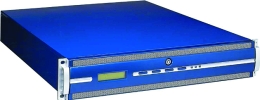

Casinos that still make use of older analog video-tapes for storing video footage from close circuit television (CCTV) cameras need to consider digital storage. The benefits far outweigh initial outlay costs, offering lowered ongoing maintenance costs with an impressive return on investment (ROI).
This is the word from Riaan Kruger, managing director at Technology and Procurement Holdings T/A Techpro, a company that specialises in CCTV solutions that meet the needs of the casino industry.
CCTV cameras are key to providing evidence when resolving disputes and identifying perpetrators of crimes. However, casinos are also legally required to monitor all areas where gambling takes place, as stipulated by the National Gaming Board. This makes an investment in this type of technology not only necessary but compulsory.
"Storing CCTV footage in a digital format and onto disk has seen relatively slow uptake in the local market," says Kruger, "but migrating from traditional methods where analog images are stored on video tapes may soon become essential as manufacturers begin to phase out the production of video cassette recorders (VCR)."
Technological advances have also made digital storage more palatable, Kruger notes. "A few years ago, digital storage was not a popular choice as slower central processing unit (CPU) speed rates made it difficult to record 25 pictures a second - another requirement enforced by legislation - without image degradation. As technology advances and CPU speeds increase, this is no longer a hindering factor."
Those that consider the digital route stand to reap a multitude of additional business benefits. Casinos that still use tape for storage face the challenges of degradation, poor quality playback and slow retrieval procedures. If a query is lodged or a dispute arises, gambling in a particular area or table may not continue until the problem is resolved, translating into lost revenues. Time is thus of the essence. Since casinos generally make reactive use of video footage, viewing images after an incident has taken place, fast access to footage that is of a decent quality is paramount. Storing to disk affords these benefits. "Simultaneous playback of footage recorded at different times on the same video stream is also possible," notes Kruger.
While these are compelling reasons to change storage formats, price is still an inhibitor. Says Kruger: "Most casinos plan three-year purchase cycles. While the low investment to store analog footage onto tape might initially seem attractive due to the affordability of VCRs, what needs to be considered is the cost of ongoing maintenance and media (tapes). This makes the investment far costlier further down the line."
Says Grant Naude, marketing director at Basix Technologies, "To convert analog images to a digital format, an encoder or digital recorder is required. This device converts the analog signal to digital using highly advanced algorithms, which allow for the compression of the video into various formats. File sizes typically range from approximately 8-25 kilobytes (Kb) per picture (frame). However, casino industry laws dictate that realtime (25 images per second) recording and playback is instituted 24/7. This footage must be archived for at least seven days, constituting large amounts of data that must be stored with accessibility at the click of a mouse. As well as being available online 24/7, these stored images must be fault tolerant and seamlessly redundant, allowing the user to record and retrieve footage even when disk failure has occurred."
Raul Del Fabbro, storage division manager from distributor, Drive Control Corporation, concurs: "RAID attached storage meets all these requirements and complies with casino legislation along with other industries such as banking and cash distribution sectors that all require footage to be stored for determined periods with the safety that redundant disk arrays provide."
VCRs additionally require ongoing maintenance due to their mechanical nature. These devices operate 24x7x365 as casinos are a 24-hour operation. Tapes degrade and must be replaced. In comparison, the initial outlay of a digital solution is usually recovered halfway through the three-year cycle. It yields a substantial return on investment with its low total cost of ownership contributing to this.
"Storing images in a digital format onto disk is cost effective. Images can be compressed and stored efficiently onto a redundant array of inexpensive disks (RAID) that provide the distinct advantage of resilience and redundancy. RAID technology allows segments of footage to be written across the entire spectrum of disks and in the event of failure of a hard disk, parity enables the replacement of the missing data or footage," says Del Fabbro.
DCC's Arena RAID disk arrays are available in a variety of configurations, providing a scalable platform that accommodates future growth.
In a casino environment, 1500 cameras or more can be installed and connected to an equal number of VCRs. This requires a substantial amount of space - a control room of approximately 168 m2 is needed to contain 1500 VCRs. This is reduced to approximately 20 m2 with a digital storage solution.
The prudent route to take is to gradually migrate to digital storage by converting a small proportion of analog storage to digital storage. Casinos and other businesses need to weigh up the benefits of spending less upfront on an analog system and dealing with spiralling ongoing costs. Be wary of being penny-wise and pound-foolish.
For more information contact Raul Del Fabbro, Drive Control Corporation, 011 887 8927, [email protected]

© Technews Publishing (Pty) Ltd. | All Rights Reserved.